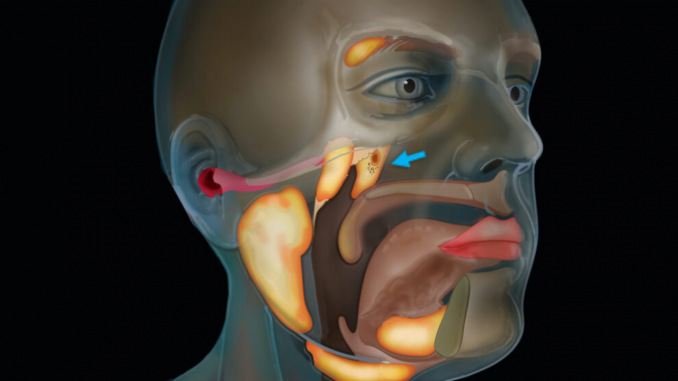
In News
Researchers have identified a new organ in the throat.
In-Detail
- The Netherlands Cancer Institute researchers have discovered a new organ in the throat.
- The researchers identified salivary glands in a new location in the throat.
- This will help radiation oncologists to bypass the area in patients with head and neck tumoursto avoid any complications during treatment.
Salivary Gland System
- The researchers were studying a new type of scan to investigate the side effects of the radiation on the head and neck when they identified two areas in the back of the nasopharynx.
- These areas are similar to salivary glands and have the same characteristics.
- In the human body, the salivary glands have three major paired glands and 1000 minor glands that are spread over the mucosa.
- The salivary glands produce saliva which is necessary for swallowing, digestion, dental hygiene, tasting and mastication.
- Researchers studied scans of 100 people and found a bilateral structure at the back of the nasopharynx.
- Researchers named the new gland “tubarial glands”.
- This gland would qualify as the fourth major salivary gland and the other glands are named as parotid, sublingual and submandibular.
- These glands are present at the inaccessible anatomical location under the base of the skull.
- This area can be visualized only by using nasal endoscopy.
- The conventional CT scan, MRI and ultrasound have not allowed the visualizations.
- A new type of scan called the PSMA PET/CT scan was used which revealed the location of the new organ.
- Researchers identified that the major function of the gland is to moisten and lubricate the nasopharynx and the oropharynx.
Importance of the Research
- Researchers believe that the discovery may help some cancer patients with head and neck tumours.
- The cancer patients are treated with radiation therapy which can damage the salivary glands.
- Now the radiation oncologists can bypass these areas and protect them from the side effects of radiation.
- The side effects of the radiation can lead to complications like trouble in speaking and swallowing.
Also, the discovery will help doctors determine issues in the nasopharynx and oropharynx which were earlier proven to be difficult

Leave a Reply
You must be logged in to post a comment.